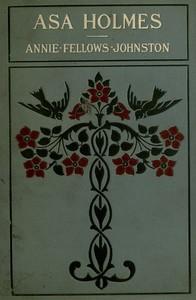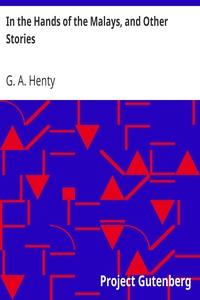|
|
Read this ebook for free! No credit card needed, absolutely nothing to pay.Words: 123724 in 22 pages
This is an ebook sharing website. You can read the uploaded ebooks for free here. No credit cards needed, nothing to pay. If you want to own a digital copy of the ebook, or want to read offline with your favorite ebook-reader, then you can choose to buy and download the ebook.

: The Life and Adventures of Bruce the African Traveller by Head Francis Bond Sir - Ethiopia Description and travel; Bruce James 1730-1794 Travel@FreeBooksWed 07 Jun, 2023 h he much needed after so rude a journey, made with such diligence that two of his horses had died from fatigue; but as the basha was unfortunately at variance with Mr. Fraser, Bruce was much disappointed at learning that it would be absolutely necessary for him to return by the coast of the Lesser Syrtis to Tunis, to reside there until Mr. Harrison, who was appointed by government to settle the differences with the Barbary States, should solicit permission for him to travel through the dominions of Tripoli. To Tunis, therefore, Bruce returned, and remained there till August, 1766, when this permission reaching him, he again crossed the desert, by Sfax and Gerba, to Tripoli, where he was hospitably received by the French, Venetian, and British consuls. From Tripoli he despatched an English servant to Smyrna with his books, drawings, and supernumerary instruments, having torn from his books those pages which he conceived might be of service in the Pentapolis or other parts of the Cyrenaicum, and by these precautions most fortunately saved the greater part of his labours in Africa. He then crossed the Gulf of Sidra, formerly known by the name of Syrtis Major, and arrived at Bengazi, the ancient Berenice, built by Ptolemy Philadelphus. The brother of the Bey of Tripoli commanded here, a young man, weak in understanding and in health. For more than a year Bengazi had been suffering from severe famine; many people died from starvation every day, and some of the living were actually hovering round the corpses of the dead for food which human nature shudders to think of. Bruce at once fled from this dreadful scene. Travelling over a great part of the Pentapolis, he visited the ruins of Arsino? and Ras Sem, and then approaching the seacoast, came to Ptolemeta, the ancient Ptolemais, the walls and gates of which he found still entire. Here he was informed that the Welled Ali-Arabs had plundered the Morocco caravan, which he had met in the desert; that the pilgrims had been left to perish for want of water; that there was a famine at Derna, the neighbouring town to which he had intended to proceed; that the plague had also appeared, and that the town was engaged in a civil war. This torrent of bad news was irresistible; and Bruce at once resolved to fly from this inhospitable coast, and save for the public that knowledge and information which he had already so resolutely and painfully acquired. Accordingly, with his little party, he embarked on board a small Greek vessel bound for Lampedoza, but the destination of which the master had agreed to change to Crete. The vessel was badly appointed; and, when it was too late, Bruce found that, although she had plenty of sail, she carried not an ounce of ballast. A number of half-famished men, women, and children, anxious to fly from the dreadful fate which awaited them, crowded on board; but the passage was short, the vessel light, and the master, as Bruce supposed, well-accustomed to these seas. At daybreak the next day they sailed; and it was then discovered that the captain was entirely ignorant of his duty, and wholly unable to manage his ship. A violent storm overtook them, and the vessel, falling to leeward, struck on a rock near the entrance of the harbour of Bengazi: fortunately, however, the wind suddenly lulled, and Roger M'Cormack, Bruce's Irish servant , lowered the largest boat, into which he, Bruce, and a multitude of people instantly jumped. Fearing they would be swamped, they pushed off from the ship, and with two oars endeavoured to row the boat ashore. Bruce had thrown off all his clothes except a short under-waistcoat and his linen drawers; a silk sash or girdle was wrapped round him; a pencil, pocket-book, and watch were in the breast-pocket of his waistcoat; two Moorish and two of his English servants accompanied him; and the rest of his party remained on board. They had scarcely got a boat's length from the ship, when a wave nearly swamped them, and a shriek of despair announced their helpless situation. The next wave was approaching evidently to overwhelm them; and Bruce, fearing that some woman, child, or helpless man would cling hold upon him, entangle him, and thus ignominiously drag him down, resolved at least to make an effort to save himself, and, exclaiming to his servants, both in Arabic and English, "We are lost! If you can swim, follow me!" he jumped overboard. At this critical moment, the Arabs, who were but two short miles from the shore, came down in crowds to plunder the vessel, all the people from which were now taken on shore, those only being lost who had perished in the boat. Bruce was first awakened from his trance by a blow with the butt end of a lance on the back of his neck; but it was merely accident that it had not been the point, for his short waistcoat, which had been purchased at Algiers, and his sash and drawers cut in the Turkish fashion, made the Arabs believe he was a Turk; and, after many hard blows, kicks, and curses, they stripped their defenceless and exhausted victim, leaving him as naked as their barren shore. After treating the rest of the passengers and crew in the same manner, they sought to plunder the bodies of those who had been drowned. In the mean while, Bruce walked, or rather crawled, to some white sandy hillocks, where he sat down and concealed himself as well as he could, for he knew that if he approached the tents where the women were while he was naked, he would receive bastinadoes considerably heavier than the last. Smarting from the discipline he had already undergone, it suddenly occurred to him that, by the gibberish in imitation of Turkish which the Arabs had uttered to him while they were beating and stripping him, they had taken him for a Turk, and had treated him accordingly. At this moment an old Arab, attended by several young men, came up to him. He offered them the salute of "Salum Alicum," with which at first they were offended, asking him what, as a Turk, he had to do there? Bruce very readily replied that he was no Turk, but a poor Christian physician, a dervish, that went about the world seeking to do good for God's sake; that when he was wrecked he was flying from famine, and was going to Greece to get bread. A ragged, dirty baracan was immediately thrown over him, and he was conducted to a tent, through the end of which appeared a long spear, which is the mark of sovereignty. The sheikh of the tribe being at peace with the Bey of Bengazi, asked Bruce many questions, and at last ordered him a plentiful supper, at which he had the happiness of meeting his attendants. Camels were then brought, and the whole party proceeded to Bengazi, from whence Bruce wrote to the sheikh, entreating him to endeavour to fish up his cases, for which he offered a handsome reward: this, however, was not effected, and he lost a sextant, telescope, timepiece, a small camera obscura, some guns, pistols, several drawings, and many of his notes and observations. At Bengazi he fortunately met with a small French sloop, the master of which so gratefully remembered that Bruce had rendered him a trifling service at Algiers, that he generously offered even to lend him money. After having been detained at Bengazi about two months, during which time he and his party had little to subsist on but fish, which they themselves caught, they sailed in the French sloop from the bay; and, bidding farewell to the coast of Africa, they landed at Canea, a small fortress at the west end of the island of Crete. The beating which Bruce had received at Bengazi left marks, which, after a considerable time, totally disappeared; but the relentless ague, which, in consequence of his exertions in the Sea of Ptolemeta, fixed itself on his constitution, persecuted him through all his travels, suddenly appearing and oppressing him in moments of his severest difficulties. He was first seized with this disorder at Crete, where he remained for some days dangerously ill. From Canea he sailed to Rhodes, where, with very great pleasure, he found his books. He then proceeded to Castelrosso, on the coast of Caramania, in Asia Minor, where he had been credibly informed there were very magnificent ruins; but his fever increasing, he found it impossible to prosecute this undertaking: he was therefore reluctantly obliged to abandon it, and, proceeding again to sea, he landed on the continent of Asia, at Beiroot, near Sidon, on the coast of Phoenicia, in June, 1767. Bruce was now in a very weak state of health; he possessed drawings and notes which would have offered to most men alluring and tranquil occupation; he had undergone fatigues which faithfully and frankly warned him to give rest to his constitution; a new quarter of the world was now before him--new in its dangers, its history, and its inhabitants; but the enterprising spirit of Bruce remained unaltered; and, careless of his shattered frame, he now resolved that, previously to entering on his daring attempt to reach the source of the Nile, he would endeavour, as he said, "to add the ruins of Palmyra to those of Africa!" There are two tribes, almost equally powerful, who inhabit the deserts around Palmyra: the one the Anneci, remarkable for the breed of their horses; the other the Mowulli, who are excellent soldiers. These two tribes were not actually at war, nor were they at peace; they were merely upon what is termed ill terms with each other--a very dangerous time for strangers to have any dealings with either. Bruce would have gone at once from Sidon to Baalbec, but it was then besieged by the Druses of Mount Libanus. He therefore went to Tripoli in Syria, and from thence set out for Aleppo; but, suddenly sinking under his Bengazi ague, he was just able to reach the house of M. Belville, a French merchant, to whom he was addressed for credit; and Bruce always declared, "that, had it not been for his friendly attention, and the skill and anxiety of Dr. Russel, physician to the British factory, it is probable his travels would have ended at Aleppo." As soon as he was restored to health, his first object was his journey to Palmyra. Stopping at two miserable huts inhabited by a base set called Turcomans, he asked the master of one of them to show him a ford, which the man, apparently very kindly, undertook to do, although the river, the Orontes, was so violent that he felt more than once an inclination to turn back. However, suspecting nothing, he proceeded according to the directions of his guide, when, all of a sudden, he and his horse fell into such deep water, that each swam separately ashore; and when Bruce went to dry himself at a caphar or turnpike, the man who was there told him that the place at which he had attempted to cross was an old bridge, one arch of which had long ago been carried away; that he had consequently fallen into the deepest part of the river; and that the people who had misguided him were an infamous banditti. From Hassia Bruce and his party went to Cariateen, where, to their great surprise, they found about two thousand of the Anneci encamped: they were treated with civility, and passed the desert between Cariateen and Palmyra in a day and two nights, proceeding all the while without sleeping. Free books android app tbrJar TBR JAR Read Free books online gutenberg More posts by @FreeBooks
: Asa Holmes; or At the Cross-Roads by Johnston Annie F Annie Fellows Fosbery E Illustrator - United States Social life and customs Fiction; Conduct of life Fiction; Villages Fiction; Conversation Fiction; Older men Fiction; General stores Fiction@FreeBooksWed 07 Jun, 2023

: British Quarterly Review American Edition Vol. LIII January and April 1871 by Various - English periodicals@FreeBooksWed 07 Jun, 2023
|
Terms of Use Stock Market News! © gutenberg.org.in2025 All Rights reserved.






